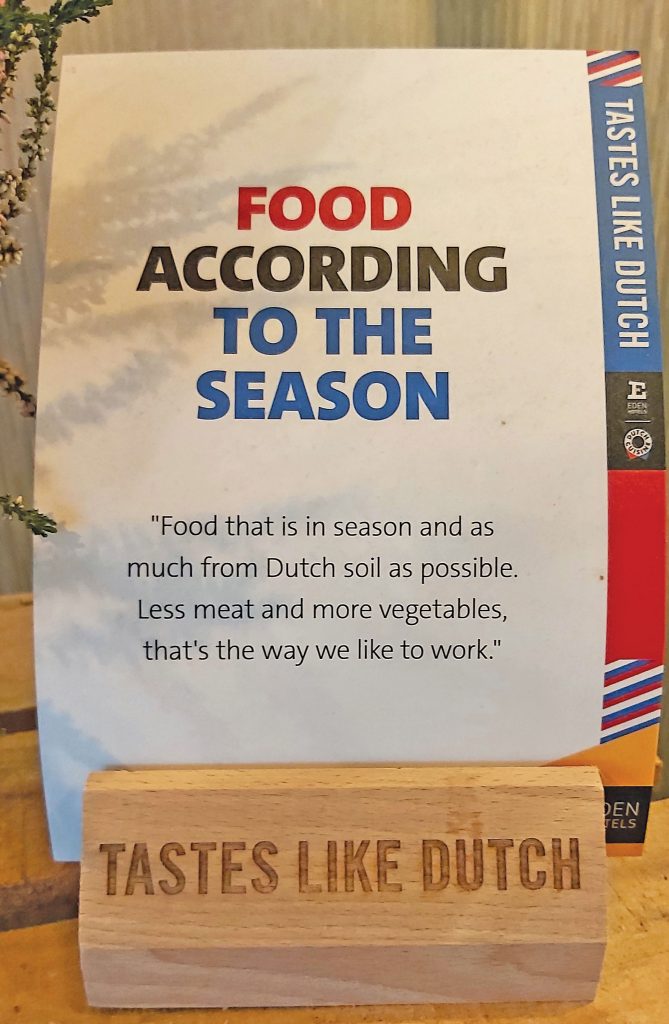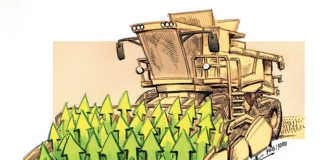
Photo: Lindi Botha
Do you foresee that food production in the Netherlands will decrease due to more stringent regulations from the Green Deal?
Would it be a bad thing if it did? If we consume less meat and dairy products then it would be beneficial. Some 80% of our agricultural land is used to produce animal protein, of which most is feed for livestock.
This is not the most efficient way for us to get our protein and we are running into a lot of problems in the Netherlands as a result.
READ Get ready to profit from plant- and insect-based proteins
We have a huge problem where the soils are so full of nitrogen it is running off into the water systems. We are European champions in biodiversity loss and 99% of our water is polluted.
Although we are getting a lot of ‘cheap’ food, the external effects are negative. We are all in agreement, including conventional farmers, that we need to change the way we grow and consume food.
The Green Deal stipulates that we need to reach a 50% reduction in pesticide use, and a 20% reduction in synthetic fertilisers by 2050. These are goals we are very happy about.
In the Netherlands, organic farmers make up 4% of the farming sector, and our goal is to get to 15% this year, and eventually 25% as per the Green Deal’s specifications. That leaves 75% of food production that can be farmed conventionally.
The whole transition to greener food production means that we need to rethink how we are producing food.
Not all the land on which we currently produce animal protein and feed for livestock can be transitioned to human food crops, but we need to be very critical of where we grow what.
Is it smart to be growing barley and oats to feed animals instead of making bread or other food for people? Importing soya from South America, where rainforests are being cut down, to feed our animals is not a smart way to produce food.
Consuming game meat from gazelles roaming the Karoo, on the other hand, has minimal environmental impact and would be a perfectly suitable protein source for South Africans.
Would the planned reduction of animal protein production in the European Union not lead to counter-balanced diets?
We should all be eating a more vegetarian and plant-based diet. Animal protein should be more of a luxury item that we eat a few times a week – not every day in big quantities.
Some of the biggest problems we are seeing in the environment are as a result of animal farming. Animal husbandry is the largest emitter of emissions within the agriculture sector.
Furthermore, we need to change our whole outlook on animals and how we treat them.
In 20 years’ time we are going to look back to the years we treated animals like we do today, considering what we know about what animals feel and their level of intelligence, and be appalled.

With regards to South Africa, I’ve seen the portions of meat you eat – it’s huge. As a human being, you don’t need that amount of protein in one sitting. Ideally you should be having 100g of meat a few times a week, not every day.
If South Africans can just reduce the portions of meat they eat and include more salad it will already go a long way to greater sustainability.
In the Netherlands, this topic is front and centre and I realise that there are many more pressing issues in South Africa, but I would strongly advise South Africans to rethink their diets, especially those who can afford to do so.
Does organic farming not create more waste since there is more ‘imperfect’ food being produced that has no market?
Organic is not just about not using pesticides to prevent damage to produce. It’s about the whole approach to farming to work in harmony with nature. It’s like a person that gets enough sleep, eats healthy and maintains overall health.
READ Making organic fruit farming work
The chances of you getting ill and being susceptible to viruses is less than if you spent your whole life in hospital on a food drip. We have seen that in farming systems where nature is in balance, plants are far healthier and more robust.
They can better withstand pests and diseases and so require far less chemical input.
In organic livestock production, the veterinary costs are 50% less than conventionally farmed meat.
As a society we need to learn to accept a spot on an apple or avocado and not expect picture-perfect fruit if we want to reduce our waste.
Will organic farming make food more expensive?
It will make food more valuable. Food is already expensive, but the full cost is not paid at the grocery store, but rather through the health system and taxation to be able to clean the water systems, invest in fighting climate change and mitigating its effects.
If we take into account what is causing climate change, like the production and use of synthetic fertilisers, we see the true cost of producing food, and then organic food, with its many benefits, does not seem that expensive at all.
We need to look at the value of food far more closely and ensure that those who can’t afford healthy food can still have access to it.
But what needs to be addressed is people who don’t want to pay €0,20 (R3,96) more for a kilogram of organic produce, but are flying around the world a few times a year to go on holiday, going to Starbucks for fancy takeaway cappuccinos.
This is the conversation I want to be having. It’s not a black-and-white situation where people have the excuse that they can’t afford to pay for organic food.
Then there is also the issue of food waste. We are throwing away one third of all the food we produce and this is an extremely bad situation.
When you don’t have a big income and most of it needs to go to food then you don’t throw any of it away.
But in the Netherlands, where food expenditure makes up 11% of household spending, throwing food away is done without much thought or concern.
The argument has been made that if the Netherlands decreased food production to meet climate goals, it would have no impact on food availability, only on the amount available for export. Do you think reducing exports is feasible?
There are two types of exports – we are part of the EU and we export to our neighbours. I have no problem with that.
My problem is that rainforests in South America are being cut down to plant soya which we are then importing to feed our dairy cows, creating all the associated environmental problems in the Netherlands, and then exporting this milk as baby formula to China.
I would prefer that we rather take our expertise to China to set up factories there to produce formula for that market, using cow feed produced in that country.
READ It’s time for SA to rethink its food security strategies
Then we don’t have a problem that is created in South America and the Netherlands, all to feed Chinese babies.
The excuse of not wanting to reduce exports is often used by those who don’t want to reform the agricultural system, because exports contribute to the country’s economy.
But we are not asking the farmers to stop producing food. We are asking them to switch to organic meat production, for example, which has 70% less nitrogen emissions and is better for animal welfare.
Organic farming does not pollute water systems, does not contribute to climate change and contributes to healthy soils. Those that are producing in organic systems should be getting higher prices so they can sustain production while protecting the environment.
But there needs to be political will for this to happen. Yes, there will be less milk if everyone switches to organic dairy farming, but if the farmer gets more per litre then it does not come with negative effects for the farmer.

If you look at the amount of cappuccinos people buy every day, if we were to switch to organic milk, which only costs €0,10 (R1,98) more per litre than conventional milk, it would reward the farmers and the environment, and the consumer would not be unnecessarily burdened.
So I am in discussion with the national trade authority in the Netherlands to get coffee outlets to switch to organic milk.
Some supermarkets here have announced they will only be selling organic potatoes. Some consumers say they want to be greener outside of the store, but when they enter, they somehow become a different person and then they don’t want to pay for the greener option.
We can’t expect much from consumers; instead we need to reduce their choice for buying non-green. Food companies are being accused of being part of the problem, so I expect that we will be seeing more food companies making procurement decisions like this in favour of the climate.
There are a lot of new innovations that will reduce methane emissions in livestock farming. Why is the focus then skewed towards reducing output?
This story is being held up by conventional farmers as an excuse not to change. They’re saying, ‘don’t worry everyone, go back to sleep, technology will solve the problem’.
But the problems are so big we need to take every avenue we can to bring down emissions.
If this technology really works, then great, but we still need to look at farming more sustainably.
should not happen is that we all go back to business as usual and then in 15 years’ time wake up again to the fact that we didn’t do enough when we had the chance.
We can’t just ignore the issue and trust the farmer to feed the right additives and employ the right technology to bring down emissions while not making any other changes to the way in which they are farming.
to say we will see any real progress if we don’t address the core issue. Emissions are just less with organic farming, so why not just convert?
Change is difficult. There are all kinds of stages and challenges you face when you make drastic changes in your way of operating, and government needs to assist farmers in this transition in whatever way they can to make sure it happens.
The focus in Europe is on sustainability, whereas the focus in Africa is about availability and affordability. Climate emissions are of no concern to those struggling to feed themselves.
It is understandable that sustainability is not a big focus in Africa. When you look at Maslow’s Hierarchy of Needs, food availability is the most important priority; focusing on environmental issues would be the least important and only given attention when all the other needs are met.
The EU has done a lot to mess up the world – socially, environmentally – so we have a lot to account for. It’s our responsibility to fix the problems.
READ The quest for healthy food
Many farmers in Africa are already part of the solution because they are farming in harmony with nature in extensive systems. To expect them to ‘pay’ for climate change is unfair.
I agree that there is an arrogance in the West that we have now realised our mistakes and are preaching to everyone, telling them to get on board with the changes that need to be made to lower carbon emissions.
India has the world’s fastest-growing population, and although they are predominantly vegetarian, there is a shift towards meat consumption. To tell them now that they should not be eating meat to save the planet is pretty arrogant.
Yes, it would make a huge difference to emissions if China and India were not to increase meat consumption, but who are we to dictate, after we have been enjoying meat for all these years?
The discussion around organic farming can be polarising. What do you think is key to advancing this cause?
Collaboration between all stakeholders in the food industry is needed to realise our goals. The organic sector can’t operate independently from the conventional farming sector.
If we don’t collaborate with input suppliers, even those in the chemical industry, we will struggle to transform our food industry.
Farmer organisations, supermarkets, NGOs, government and the private sector need to work together to ensure all the supporting links in the chain are there.
The consumer side also needs to be involved because they need to realise that ‘perfect’ food is harming the planet.
Produce comes in all shapes and sizes, and expecting everything to conform to packaging or our idea of what it must look like is not helpful.
In the Netherlands we talk about verbinding – this means we bring people together from all sectors within the industry to the table.
It is no use being in a polarised position where all we do is say how bad conventional farming is, and how everyone should switch to organic. We need to be involved in mainstream discussions, otherwise organic will never become mainstream.
Email Michaël Wilde at [email protected].









